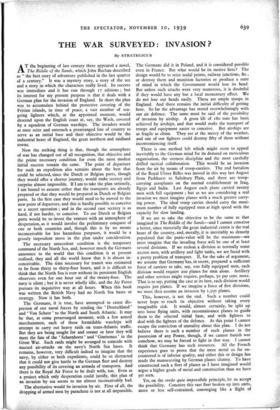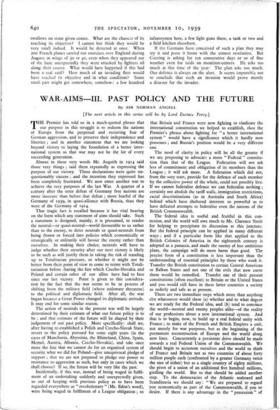THE WAR SURVEYED : INVASION ?
By STRATEGICUS
AT the beginning of last century there appeared a novel, The Riddle of the Sands, which John Buchan described as " the best story of adventure published in the last quarter of a century." It was a mystery story, a story of the sea and a story in which the characters really lived. Its success was immediate and it has run through 17 editions ; but its interest for my present purpose is that it deals with a German plan for the invasion of England. In short the plan was to accumulate behind the protective covering of the Frisian islands, in time of peace, a vast number of sea- going lighters which, at the appointed moment, would descend upon the English coast at, say, the Wash, covered by a squadron of German warships. The invaders would at once seize and entrench a prearranged line of country to serve as an initial base and their objective would be the industrial heart of England, the great northern and midland towns.
Now the striking thing is that, though the atmosphere of war has changed out of all recognition, that objective and the prime necessary condition for even the most modest initial success remain the same. The point of departure for such an expedition also remains about the best that could be selected, since the Dutch or Belgian ports, though they would offer a shorter journey, would make secrecy and surprise almost impossible. If I am to take the plan seriously, I am bound to assume either that the transports are already prepared or that they would be prepared in Dutch or Belgian ports. In the first case they would need to be moved to the new point of departure, and this is hardly possible to conceive as a secret operation ; and in the second case secrecy is as hard, if not harder, to conceive. To use Dutch or Belgian ports would be to invest the venture with an atmosphere of desperation, as it would involve the preliminary conquest of one or both countries and, though this is by no means inconceivable for less hazardous purposes, it would be a grossly imprudent move in the plan under consideration.
The necessary antecedent condition is the temporary command of the North Sea, and, however much the Germans announce to the world that this condition is at present realised, they and all the world know that it is almost in- conceivable. The time necessary for transit was estimated to be from thirty to thirty-four hours, and it is difficult to think that the North Sea is ever without its persistent English observers even for one hour out of the twenty-four. The navy is silent ; but it is never wholly idle, and the Air Force pursues its inquisitive way at all hours. When this book was written the British Navy had no North Sea bases or strategy. Now it has both.
The Germans, it is true, have attempted to cause dis- persion of our naval forces by sending the ' Deutschland' and ' Von Scheer' to the North and South Atlantic. It may be that, at some prearranged moment, with a few armed merchantmen, each of these formidable warships will attempt to carry out heavy raids on trans-Atlantic traffic. But they are being sought for and sooner or later they will meet the fate of the Scharnhorst ' and Gneisenau ' in the Great War. Such raids might be arranged to coincide with massed air-attacks on the navy's North Sea bases. It remains, however, very difficult indeed to imagine that the navy, by either or both expedients, could be so distracted that it could not give battle to the German fleet and destroy any possibility of its covering an armada of transports. And there is the Royal Air Force to be dealt with, too. Even as a project which only desperation could justify, this plan of an invasion by sea seems to me almost inconceivably bad.
The alternative would be invasion by air. First of all, the dropping of armed men by parachute is not at all impossible. The Germans did it in Poland, and it is considered possible even in France. But what would be its motive here? The design would be to seize nodal points, railway junctions, &c., or destroy them and munition factories or produce a state of mind in which the Government would lose its head. But unless such attacks were very numerous, it is doubtful if they would have any but a local momentary effect. We do not lose our heads easily. There are ample troops in England. And there remains the initial difficulty of getting here. So far the advantage has rested overwhelmingly with our air defence. The same must be said of the possibility of invasion by airship. A gross lift of rSo tons has been achieved by airships, and that would make the transport of troops and equipment easier to conceive. But airships are as fragile as china. They are at the mercy of the weather, and one of our fighters could destroy fifty of them without inconveniencing itself.
There is one method left which might seem to appeal inevitably to the German mind for its demand on meticulous organisation, the sternest discipline and the most carefully drilled tactical collaboration. This would be an invasion from the air by means of troop-carriers. The znd battalion of the Royal Ulster Rifles was moved in this way last August from Parkhurst to Salisbury Plain, and there arc troop- carrying aeroplanes on the normal establishment in Iraq, Egypt and India. Last August each plane carried twenty men with full equipment ; but as we are considering a real invasion we must imagine planes with a much greater carry- ing power. The ideal troop carrier should carry the maxi- mum number of fully equipped men at high speed with the capacity for slow landing.
If we are to take the objective to be the same as that imagined in The Riddle of the Sands—and I cannot conceive a better, since materially the great industrial centre is the real heart of the country, and, morally, it is inevitably so densely populated that the panic-value will be the maximum—we must imagine that the invading force will be one of at least several divisions. If we reckon a division as normally some 20,000 men, with artillery and light tanks, we are faced with a pretty problem of transport. If, for the sake of argument, we assume that Germany has, in secret, prepared a sufficient force of carriers to take, say, too fully equipped men, each division would require 200 planes for men alone. Artillery and other services might require, perhaps, 5o per cent. more. That is to say, putting the case at its best, each division would require 300 planes. If we imagine a force of five divisions, we must then assume an invasion by r,5oo planes.
This, however, is not the end. Such a number could never hope to reach its objective without taking every imaginable risk. It would, almost certainly, be split up into loose flying units, with reconnaissance planes to guide them to the selected initial base, and with fighters to deal with the fighters of the defence. At this point I cannot escape the conviction of unreality about this plan. I do not believe there is such a number of such planes in the possession of any Power, though, if we cannot banish war somehow, we may be forced to fight in that way. I cannot think that Germany has such resources. All the French experience goes to prove that the mere metal so far en- countered is of inferior quality, and either this or design has made the manoeuvring by German planes clumsy. To have constructed such a fleet of planes as I have imagined would argue a higher grade of metal and construction than we have yet seen.
Yet, on the credo quia impossibile principle, let us accept the possibility. Conceive this vast fleet broken up into units, more or less self-contained, converging like a flight of swallows on some given centre. What are the chances of its reaching its objective? I cannot but think they would be very small indeed. It would be detected at once. When 200 French planes carried out exercises over England during August, in wings of 3o or 40, even when they appeared out of the haze unexpectedly they were attacked by fighters all along their course. What would have happened if this had been a real raid? How much of an invading fleet would have reached its objective and in what condition? Some small part might get somewhere, somehow : a few hundred infantrymen here, a few light guns there, a tank or two and a field kitchen elsewhere.
If the Germans have conceived of such a plan they may try it and press it home with the utmost resolution. But Goering is asking for ten consecutive days or so of fine weather even for raids on munition-centres. He asks too much at this time of the year: The plan asks too much. Our defence is always on the alert. It seems impossib:e not to conclude that such an invasion would prove merely a disaster for the invader.





































 Previous page
Previous page